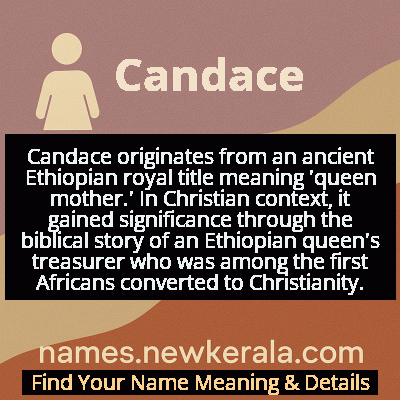Candace Name Meaning & Details
Origin, Popularity, Numerology Analysis & Name Meaning of Candace
Discover the origin, meaning, and cultural significance of the name CANDACE. Delve into its historical roots and explore the lasting impact it has had on communities and traditions.
Name
Candace
Gender
Female
Origin
Christian
Lucky Number
4
Meaning of the Name - Candace
Candace originates from an ancient Ethiopian royal title meaning 'queen mother.' In Christian context, it gained significance through the biblical story of an Ethiopian queen's treasurer who was among the first Africans converted to Christianity.
Candace - Complete Numerology Analysis
Your Numerology Number
Based on Pythagorean Numerology System
Ruling Planet
Uranus (Rahu)
Positive Nature
Strong sense of order, loyal, practical, and disciplined.
Negative Traits
Stubborn, overly serious, rigid, and prone to feeling restricted.
Lucky Colours
Blue, gray.
Lucky Days
Saturday.
Lucky Stones
Blue sapphire.
Harmony Numbers
1, 7, 8.
Best Suited Professions
Managers, engineers, accountants, organizers.
What People Like About You
Dependability, discipline, practicality.
Famous People Named Candace
Candace Cameron Bure
Actress and Author
Known for role as D.J. Tanner on Full House and as a Christian media personality
Candace Owens
Political Commentator
Conservative activist and author known for her political commentary
Candace Bushnell
Author
Created Sex and the City column and books that inspired the hit TV series
Saint Candace
Biblical Figure
Ethiopian queen's treasurer converted to Christianity by Philip the Evangelist in Acts 8
Name Variations & International Equivalents
Click on blue names to explore their detailed meanings. Gray names with will be available soon.
Cultural & Historical Significance
The Christian association is particularly significant as it represents one of the first documented instances of Christianity reaching beyond the Mediterranean world. The Ethiopian eunuch's conversion story symbolizes the universal nature of the Christian message and God's plan to include all nations. This biblical narrative has made Candace a meaningful choice for Christian families, especially those interested in names with strong scriptural foundations that also celebrate diversity and global Christianity. The name thus serves as a bridge between ancient African civilization and early Christian history, embodying both royal dignity and spiritual transformation.
Extended Personality Analysis
Women named Candace are often perceived as possessing natural leadership qualities and regal confidence, reflecting the name's royal origins. They tend to be strong-willed, determined individuals with a clear sense of purpose and the ability to inspire others. Many Candaces exhibit a blend of traditional values with modern independence, often showing loyalty to family and principles while maintaining their own distinctive identity. Their personality often combines warmth with authority, making them effective in both personal relationships and professional settings.
The Christian association of the name sometimes correlates with spiritual depth and moral conviction, though this manifests differently across individuals. Many Candaces are known for their integrity and strong ethical compass, whether expressed through religious faith or personal principles. They often demonstrate resilience in facing challenges and possess a nurturing quality that makes them protective of those they care about. The name suggests someone who is both grounded and aspirational, capable of both leading and nurturing those around them. This combination of strength and compassion makes Candaces often sought as friends, mentors, and community leaders who can be relied upon in times of need.
Modern Usage & Popularity
In contemporary times, Candace remains a recognizable though not overly common name. It peaked in popularity during the 1970s and 1980s in the United States, ranking within the top 200 names during that period. While its usage has declined since then, it maintains a steady presence, often chosen by parents seeking a classic name with royal connotations and Christian significance. The name is particularly popular in Christian communities due to its biblical association with the Ethiopian queen's treasurer's conversion story. Modern variations like Candice are also common, and the nickname 'Candy' provides a more casual alternative. The name continues to be used across English-speaking countries and maintains its appeal as a name that balances tradition with strength and femininity, offering both historical depth and contemporary relevance.
Symbolic & Spiritual Meanings
Symbolically, Candace represents royalty, spiritual seeking, and feminine authority. The name carries the weight of ancient queenship, symbolizing leadership, dignity, and the power of maternal influence in governance. In Christian symbolism, it represents the early expansion of Christianity beyond Jewish communities and the inclusion of African believers in the faith. The biblical story of the Ethiopian eunuch's conversion under Queen Candace's authority makes the name symbolic of spiritual openness and divine intervention across cultural boundaries. Metaphorically, Candace suggests someone who bridges worlds - connecting ancient and modern, African and Western, royal and common. The name embodies the idea that true leadership combines strength with spiritual seeking, and that faith can transcend geographical and cultural barriers to transform individuals and communities alike.

